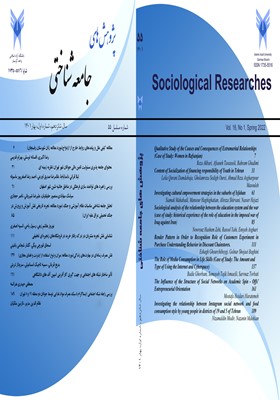تحلیل جامعه شناختی مناسبات نظام آموزشی و جنگ (مورد مطالعه، تجربه تاریخی نقش آموزش و پرورش در جنگ تحمیلی عراق علیه ایران)
محورهای موضوعی : در این فصلنامه موضوعات جامعه شناختی در اولویت چاپ هستند و موضوعات نزدیک به جامعه شناسی در اولویتهای بعد قرار می گیرندنوروز هاشم زهی 1 , رسول یاحی 2 , انسیه اصغری 3
1 - استادیار گروه علوم اجتماعی، واحد تهران شرق، دانشگاه آزاد اسلامی، تهران، ایران
2 - کارشناس ارشد مطالعات دفاعی، پژوهشگر گروه اجتماعی، مرکز پژوهشهای اجتماعی کندوکاو، تهران، ایران
3 - کارشناس ارشد جامعه شناسی، پژوهشگر گروه فرهنگی- سیاسی، مرکز پژوهشهای اجتماعی کندوکاو، تهران، ایران
کلید واژه:
چکیده مقاله :
هرسازمان برای پاسخ به اهدافی و بویژه پاسخ به نیازهای بازتعریف شده دردوره جنگ بوجود می آید. خرده نظام های اجتماعی برای تداوم حیات در بحران، هم باید مدیریت شوند و هم به مدیریت بحران کمک کنند. هدف این مقاله، تحلیل نقش وزارت آموزش وپرورش درکمک به تعادل نظام آموزشی دوران جنگ عراق علیه ایران از یک سو و خلاقیت ها در پشتیبانی از جنگ در مقطع تاریخی سال 1359 تا1367 ه.ش.ازسوی دیگراست. روش انجام تحقیق، کیفی و از نوع پژوهش تاریخی است. برای گردآوری اطلاعات از فیش تحقیق و مصاحبه استفاده شدکه با استفاده ازتمام شماری اسناد ومنابع متنی دست اول و دوم و مصاحبه با مدیران آموزش وپرورش در دوران جنگ تحمیلی صورت گرفته است. روش تجزیه و تفسیر تحلیل تماتیک می باشد. طبق یافته های پژوهش، وزارت آموزش و پرورش در بخش ایفای نقش تخصصی به تدوین مقررات و آئین نامه های آموزشی خاص زمان جنگ، تأسیس و فعالیت مجتمع های آموزشی رزمندگان در پشت جبهه ومناطق جنگی، ایجاد شرایط ادامه تحصیل و تشکیل کلاس های جبرانی و تقویتی دانش آموزان رزمنده، آموزش از طریق تلویزیون در دوران بمباران شهرها اقدام کرده است. مهمترین کنش های عمومی این وزارتخانه اقدام به راه اندازی ستاد امداد وپشتیبانی جنگ، اعزام معلمان و دانش آموزان به جبهه، مشارکت درایجاد استحکام و پناهگاه درمدارس و بازسازی مداوم مدارس بمباران شده بدست آمد. این وزارتخانه با مدیریت چالشهای اخلاقی و عدالتبنیان آموزش در پشت جبهه به تقویت حمایت جامعه ازجنگجویان عرصه نبردکمک کرد. مناسبات آموزش و پرورش و جنگ تا حد زیادی بر مثبت شدن ارزش های فرهنگی جامعه و گسترش ایدئولوژی رهبران در دهه اول پس از انقلاب اسلامی تاثیر گذاشت.
Every organization is created to respond to goals and specially to redefine needs in times of war. Social subsystems must be both managed and assisted in crisis management in order to survive the crisis. The purpose of this article is to analyze the role of the Ministry of Education in helping to balance the education system during the Iraq-Iran war on the one hand and creativity in supporting the war in the historical period from 1980 to 1988 on the other hand. The research method is qualitative and of historical research type. The data collection tool is receipt and interview, which has been done by using all the documents of first- and second-hand textual sources and interviews of education directors during the imposed war. The method of analysis is thematic analysis. According to the research findings, the Ministry of Education in the field of playing a specialized role in formulating special educational rules and regulations during the war, the establishment and operation of training complexes for combatants behind the front and war zones, creating conditions for continuing education and compensatory classes and strengthening militant students, education through television has taken place during the bombing of cities. The most important public actions of this ministry were setting up a war relief and support headquarters, sending teachers and students to the front, participating in building fortifications and shelters in schools, and continuously rebuilding bombed schools. The ministry helped strengthen community support for combatants by managing moral challenges and establishing behind-the-scenes training. The relationship between education and the war greatly influenced the positive cultural values of the society and the spread of the ideology of the leaders in the first decade after the Islamic Revolution.
_||_


